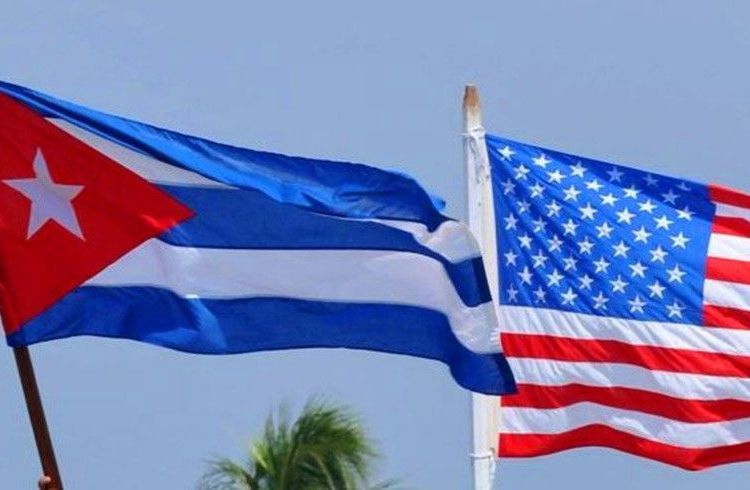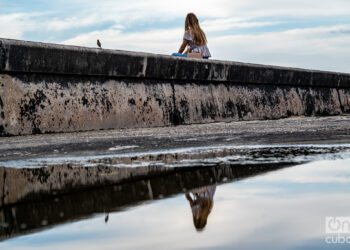The Trump administration has reversed virtually all of Obama’s policies toward Cuba. Through executive orders, Obama expanded trips to Cuba; Trump canceled people-to-people licenses, cultural exchanges, and banned U.S. residents from staying in hotels run by the military.
Obama did not put limits on remittances; Trump first limited them and then made it almost impossible for Cuban Americans to send money to their family members. Obama granted licenses to U.S. companies to operate in Cuba; Trump eliminated them. Obama restored full diplomatic relations and staffed the embassy and consulate in Havana; Trump reduced staff to a minimum and closed the consulate, affecting immigration services and family reunification for Cubans.
- Flights
January 10: The Department of Transportation announced that all charter flights to Cuba from the United States would be suspended “until further notice.”
As stated in a statement by Secretary of State Mike Pompeo, citing the existence of a letter to the Secretary of Transportation, Elaine L. Chao, the objective is to “reinforce the impact of the administration’s policy of putting economic pressure on the Cuban regime” in areas such as human rights and fundamental freedoms due to Cuban support for the government of Venezuela.
- Remittances
February 27: Western Union confirmed that it had canceled money transfers to Cuba from all countries except the United States.
The company justified its decision in the difficulties to carry out this type of operations, in an apparent reference to the embargo/blockade Washington imposes on Havana, toughened by the Trump administration with new sanctions that have generated a strong impact on the Cuban economy.
February 28: Cuban President Miguel Díaz-Canel responded to the suspension of remittances to the island from outside the United States, a decision that he attributed to the policies of U.S. President Trump. “Another measure against the Cuban people. This is how the empire acts, with total arrogance and contempt, but no one stops us,” he wrote on Twitter.
June 12: The United States announced that the sanction it had announced against Fincimex, the Cuban firm in charge of managing the reception and delivery of remittances on the island, would not become effective until there is a correction in the Federal Register.
October 23: Cuban Foreign Minister Bruno Rodríguez rejected a new measure by the Trump administration aimed at preventing remittances through the company Fincimex S.A., included on the List of Restricted Cuban Entities of the State Department. This means that remittances to Cuba through Fincimex and American International Services (AIS) would be impossible. According to the Federal Register, the ban went into effect on November 26. Last June 3, the State Department reported that it would include the Cuban financial services company Fincimex in the black list of entities with which Americans are prohibited from carrying out any transaction.
Anuncia administración Trump nuevas medidas contra remesas a Cuba
- Helms-Burton
May 3: South Florida District Judge Robert N. Scola dismissed a lawsuit filed against Booking, Hotels, Expedia and Orbitz under Title III of the Helms-Burton Act.
According to the U.S.-Cuba Trade and Economic Council, a private entity that has compiled all the information from the first year of validity of Title III, as of May 25 lawsuits had been filed against 51 companies, some included in various legal actions. Of these, 45.4% are from the United States and the rest from ten different countries, including Cuba.
Juez de Florida desestima demandas amparadas en Ley Helms-Burton
- Attack on the Cuban embassy
April 30: An unknown person fired several times with a firearm at the building of the Cuban Embassy in the United States. Although mission personnel were not harmed, the impact of the shots left visible damage to property.
Washington DC police identified the suspect as Alexander Alazo, 42, of Aubrey, Texas. He was detained on charges of possession of an unregistered firearm and ammunition, assault with the intent to kill and possession of a high-capacity magazine, a Secret Service spokeswoman said.
The incident began around 2 a.m. outside the diplomatic delegation, in northwest Washington. The metropolitan police traveled to the scene after neighbors reported hearing shots, authorities added.
La larga historia de los ataques a dependencias diplomáticas cubanas en Estados Unidos
May 5: In Alexander Alazo’s first appearance before a federal judge, prosecutors argued the need to keep him detained until the trial, considering that he could escape and for representing a danger to people and the community.
Alazo confessed to having been under psychiatric treatment, which gives the prosecutor an argument to maintain that “the criminal behavior of the accused illustrates his mental instability, demonstrated by his own statements, in the sense that he hears voices and his inability to follow the medical treatment he should, which weighs heavily against his release.”
May 11: Cuban President Miguel Díaz-Canel affirmed that Cuba was still waiting for a response from the United States government regarding the aggression suffered by the island’s embassy in the U.S. capital on April 30.
July 23: A press release issued by the District of Columbia Prosecutor’s Office revealed that Cuban Alexander Alazo, 42, was charged by a Federal Grand Jury with multiple crimes related to the shooting at the Cuban Embassy in Washington DC.
- List
May 13: The United States included Cuba on a list of countries “not fully cooperating” with the fight against terrorism, the State Department reported. According to the document, the U.S. government believes that, under section 40A of the Arms Export Control Act, these countries do not fully cooperate with Washington’s counterterrorism efforts. Based on these regulations, the sale or license for the export of defense articles and services to the States included in the list is prohibited. In addition to Cuba, the list includes Iran, North Korea, Syria and Venezuela.
The document maintains that members of the ELN guerrilla group who traveled to Havana for peace talks with the Colombian government in 2017 remained on the island in 2019, and that Cuba rejected the Colombian request to extradite ten of its leaders.
The Cuban government rejected the measure as “another step in the wrong direction” and claimed to be a “victim” of terrorism, “organized, financed and executed” by Washington.
- Human rights
March 11: In the midst of one of the lowest points in Cuba-U.S. relations, Washington released its annual report on the situation of human rights in the world.
The Cuban government responded almost immediately through the voice of Minister of Foreign Affairs Bruno Rodríguez: “The United States is not interested in human rights in Cuba. Its policy is to end the livelihood of 11 million Cubans to impose a government that responds to its interests. Despite the blockade, we will remain committed to promoting and protecting all human rights for all,” he said.
- Against the embargo/blockade
April 10: Cuban-American teacher Carlos Lazo addressed President Donald Trump to ask him to “extend a hand of solidarity” to the people of Cuba and put aside the sanctions against the island at this time of crisis in the face of the pandemic.
“The embargo of the United States against Cuba is not a weapon with millimeter accuracy, it is not an intelligent and surgical bomb that hits the target of a government that needs to be shoot down in the island. The one affected by this set of sanctions is the Cuban people.”
“Fifteen years ago, I served the United States in the Iraq war, under the banner of stars and the stripes. There, as a combat medic, I helped wounded young Americans. Between the fire and the shrapnel, I helped those children of America, who were also my brothers. Today, when the coronavirus and economic hardship threaten to bring pain and death to my homeland, I implore you to help my brothers and sisters on the Island. Help us, Mr. President! Let Cuba live! Lift the sanctions!” Lazo wrote.
- Cuba policy
May 21. The director general for the United States of the Cuban Foreign Ministry, Carlos Fernández de Cossío, stated that hostility towards the island continues increasing under President Donald Trump.
He pointed out that the White House “has taken measures as excessive as trying to prevent the arrival of the fuel that the Cuban economy requires to function” and “has increased negative action towards third countries, by committing the current administration to an extreme application of the Helms-Burton Act.”
He said that the persecution against the island’s health cooperation with other nations has increased, which he described as “an implausible action,” and that it is about imposing the matrix of opinion that the blockade/embargo against the island does not affect trade with third countries.
He acknowledged that U.S. sanctions have made it difficult to guarantee the supplies required to face COVID-19 on the island, and assured that the possibility of requesting a license from the Treasury Department to sell products to Cuba at this time of pandemic is “absurd” because processing a license like that “can take months, even a year.”
Fernández de Cossío: EEUU sigue incrementando la hostilidad contra Cuba
- Biden and Cuba
September 2: Democratic candidate and former Vice President Joe Biden insisted that if he won the November elections, he would regain the policies established by Barack Obama towards Cuba and would work to repair the relations between the two countries. “I’m trying to reverse Donald Trump’s failed policies that have caused harm to Cubans and their families,” said Biden in an interview for television channel NBC 6. The now president-elect said that Donald Trump has done nothing to promote democracy and human rights on the island.
- Doctors
June 11: Secretary of State Mike Pompeo demanded an explanation from PAHO for its role as “intermediary” in the transfer of doctors from Cuba to Brazil, and threatened it for facilitating what he called “forced labor” of doctors in that country.
Carlos Fernández de Cossío, director general of the Foreign Ministry for the United States, affirmed on Twitter that Pompeo “uses coercion, intimidation and extortion” against PAHO “in his desire to attack Cuba.” The diplomat also wrote that the Secretary of State “will not be able to obscure the wide recognition of the solidarity effort of our international medical cooperation.”
- Drugs
May 18: Border guard troops from the Ministry of the Interior (MININT) have prevented 30 tons of drugs from reaching the United States over the past decade.
In 2019, Cuba seized more than a ton and a half of drugs in the island’s territorial waters, and so far this year they have detected 300 kilograms of drugs, mainly marijuana.
In early April, the government of Cuba repudiated the statements of a senior U.S. Pentagon official, quoted by Newsweek, about an alleged drug trafficking operation between Venezuela and the island.
Cuba impidió el tráfico de toneladas de drogas a EEUU, según autoridades cubanas
- New restrictions
September 22: 40 days before the presidential elections, the Trump administration closed the circle of restrictions on Cuba, by prohibiting Americans who travel to the island from staying in government-owned hotels and entering bottles of rum and boxes of cigars.
Until then, the only lodging restrictions covered facilities under military administration that came into effect last November, with the creation of a “black list.” This new list will encompass what was left out of the old list (government-owned hotels and restaurants) and include establishments run by government officials, members of the Communist Party, their family members, and other relatives. The Office of Foreign Assets Control (OFAC) announced in a new resolution that it has just created another “black list,” the Cuba Prohibited Accommodations (CPA) list, to register the names and addresses of government properties. Both lists are the responsibility of the State Department.
U.S. prohibits Americans from using tourist facilities owned by Cuban government
- More sanctions
September 30: The U.S. government sanctioned Cuban General Luis Alberto Rodríguez López-Callejas, who heads the Grupo de Administración Empresarial SA (Gaesa), the business group of the Revolutionary Armed Forces (FAR), with ramifications ranging from the hotel sector to the retail stores selling products in foreign currency, among others.
Secretary of State Mike Pompeo announced in a statement the inclusion of Rodríguez López-Callejas on the list of “specially designated and blocked” persons of the Office of Foreign Assets Control (OFAC) of the Department of the Treasury. Pompeo said that “Rodríguez López-Callejas is the head of the Cuban military-owned consortium Grupo de Administración Empresarial S.A. (GAESA),” which manages the economic jewels of Cuba (tourism, communications, real estate market, commerce and oil, among others).
- Terrorism
December 2: The Cuban government denounced acts of terrorism promoted from the United States against Cuba, at a time when the island was experiencing internal tensions after the events in the Cuban capital that involved opponents, activists and artists, mainly young people.
Gobierno cubano denuncia terrorismo desde EEUU en medio de tensiones internas
State television broadcast a report showing people who acknowledged carrying out acts of sabotage in exchange for money, following indications from residents in the United States. A summary of this was published in Granma newspaper and shared on Twitter by Cuban President Miguel Díaz-Canel.











